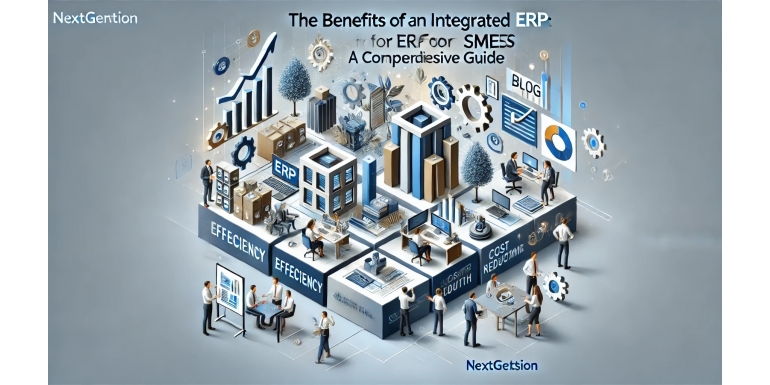
The Benefits of an Integrated ERP for SMEs: A Comprehensive Guide
In an increasingly competitive business environment, small and medium-sized enterprises (SMEs) are looking for ways to optimize their operations, reduce costs, and drive growth. One of the most effective solutions to achieve these goals is the implementation of an integrated ERP (Enterprise Resource Planning) system. This article explores in detail the benefits of an integrated ERP for SMEs, explaining how it can transform operations management, improve decision-making, and strengthen competitiveness.
What is an Integrated ERP?
An integrated ERP is software that unifies all essential processes of a company within a single platform. Unlike isolated systems for each function (such as accounting, inventory management, human resources, etc.), an integrated ERP allows all these functions to communicate with each other, sharing a common database. This means that information is available in real-time, reducing errors and improving overall efficiency.
1. Improved Operational Efficiency
One of the most significant benefits of an integrated ERP for SMEs is improved operational efficiency. By automating many manual processes, an ERP reduces repetitive tasks, minimizes human errors, and allows employees to focus on higher-value tasks. For example:
- Inventory Management: ERP enables real-time tracking of inventory levels, automates reorder processes, and reduces the risk of stockouts or overstocking.
- Automated Accounting: Financial transactions are automatically recorded, making it easier to manage accounts, invoices, and financial reports.
2. Enhanced Decision-Making
An integrated ERP provides a comprehensive, real-time overview of the company's operations, which is crucial for informed decision-making. Business leaders can access accurate and up-to-date data on sales, finances, inventory, and more. This allows them to:
- Anticipate Market Trends: With the ERP's analytical capabilities, SMEs can identify trends and adjust their strategies accordingly.
- React Quickly to Changes: With real-time information, decisions can be made faster, which is essential in a dynamic business environment.
3. Cost Reduction
Implementing an integrated ERP can also help SMEs reduce costs in several ways:
- Reduced Operational Costs: By automating processes and improving efficiency, an ERP can reduce labor costs and expenses related to human errors.
- Savings on Software: Instead of purchasing and maintaining multiple software systems for different functions, an integrated ERP offers an all-in-one solution, reducing licensing and maintenance costs.
4. Improved Collaboration
An integrated ERP fosters better collaboration between different departments within an SME. When all departments use the same system and access the same data, communication is simplified, reducing information silos and improving team cohesion. For example:
- Interdepartmental Communication: Sales, production, and logistics teams can work together more efficiently, having access to the same up-to-date information.
- Project Tracking: Projects can be monitored centrally, allowing all team members to see progress, resource usage, and deadlines.
5. Compliance and Data Security
An integrated ERP helps SMEs stay compliant with local and international regulations regarding data management and security. Modern ERP systems include robust security features, such as:
- Role-Based Access Controls: Limit access to sensitive information based on employees' roles.
- Data Encryption: Protect sensitive information from cyber threats.
- Regulatory Compliance: Adhere to standards like GDPR (General Data Protection Regulation), which is crucial to avoid penalties.
6. Scalability and Flexibility
Integrated ERPs are designed to grow with your business. As your SME expands, you can easily add new modules or features to your ERP without needing to change systems. This means that:
- Adding New Users: As your business hires new employees, they can be added to the system without difficulty.
- Expanding Functionality: If your business diversifies, the ERP can integrate new functionalities, such as supply chain management or e-commerce.
7. Better Customer Experience
An integrated ERP can also improve customer experience by offering faster and more accurate services. For example:
- Real-Time Order Tracking: Customers can receive up-to-date information on the status of their orders, enhancing their satisfaction.
- Return Management: Returns and complaints can be handled more efficiently, boosting customer loyalty.
Conclusion
For SMEs, an integrated ERP represents a strategic investment that can transform operations management, improve decision-making, and enhance competitiveness in the market. By automating processes, reducing costs, and improving collaboration and security, an integrated ERP offers a comprehensive solution for managing all key business functions. If your SME is considering modernizing its management systems, implementing an integrated ERP could be the key to reaching a new level of performance and growth.
